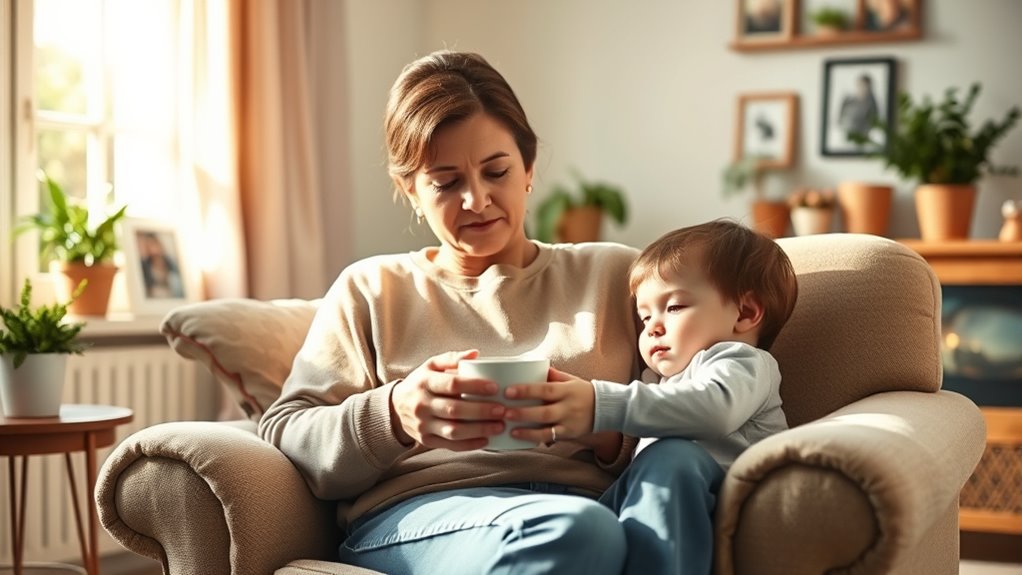Caregiver guilt is a natural feeling, but it doesn’t have to hold you back. Recognize that small achievements and self-care are essential parts of your journey. Be kind to yourself, accept your limits, and ask for support when needed. Celebrate progress rather than perfection, and remember that balancing kindness to your loved ones with kindness to yourself creates freedom. If you want to find more ways to stay compassionate while easing guilt, there’s more to discover here.
Key Takeaways
- Reframe guilt by celebrating small successes and recognizing that self-care supports better caregiving.
- Accept that no one is perfect; set realistic expectations and focus on compassionate, attentive support.
- Seek support from friends, family, or support groups to share feelings and lighten emotional burdens.
- Practice self-compassion by speaking kindly to yourself and acknowledging your emotional and physical limits.
- Remember that prioritizing your well-being sustains your ability to care kindly and effectively for loved ones.

Have you ever felt overwhelmed by the sense that you’re not doing enough as a caregiver? That nagging feeling can weigh heavily on your shoulders, making you question every decision, every moment of rest, and every ounce of patience you manage to summon. It’s important to recognize that caregiver guilt is a common experience—you’re not alone in feeling this way. The constant pressure to provide perfect care, combined with your own personal needs, creates a turbulent emotional landscape. You might find yourself blaming yourself for small mistakes or feeling guilty for taking time away, even when you know rest is essential. This guilt can become a barrier, preventing you from finding joy in the little victories or appreciating the moments of connection with your loved one.
Understanding that guilt is a natural response is the first step toward freeing yourself from its grip. Caregiving is inherently challenging, and your feelings of inadequacy don’t mean you’re failing. Instead, they highlight your deep care and desire to do right by someone you love. It’s essential to accept that you’re doing your best in a complex situation. No one is perfect, and caregiving doesn’t require perfection—only compassion, patience, and consistent effort. When guilt surfaces, try to reframe your thoughts. Recognize your efforts, celebrate small achievements, and remind yourself that taking care of yourself isn’t selfish—it’s necessary. You cannot pour from an empty cup, and neglecting your own needs only diminishes your ability to provide compassionate care.
Caregiving is tough; your efforts matter—embrace imperfection, celebrate progress, and prioritize self-care to sustain compassionate support.
Finding freedom from guilt involves setting realistic expectations. Instead of aiming for flawless care, aim for compassionate, attentive support. Acknowledge your limits and understand that asking for help isn’t a sign of weakness but a strength. Reach out to friends, family, or support groups; sharing your feelings can lighten your emotional load. Practice self-compassion by speaking kindly to yourself, just as you would to a friend in your situation. It’s okay to feel tired or frustrated—these emotions are part of the caregiving journey. Allow yourself space to breathe and to acknowledge that you’re human, not a machine. Recognizing the importance of emotional support can help you build resilience and maintain your well-being. Ultimately, balancing kindness toward your loved one with kindness toward yourself is key. When guilt tries to take hold, gently remind yourself of your intentions and the love behind your actions. Celebrate your resilience, learn from setbacks, and remember that caring for yourself is an act of love—one that enables you to care more effectively. You deserve patience, understanding, and the freedom to be imperfect, just like everyone else.
Frequently Asked Questions
How Can Caregivers Balance Self-Care With Their Responsibilities?
You can balance self-care with your responsibilities by setting clear boundaries and scheduling regular breaks. Prioritize tasks, delegate when possible, and recognize that taking time for yourself isn’t selfish; it’s necessary. Practice mindfulness, stay connected with loved ones, and listen to your needs. Remember, caring for yourself helps you become a better caregiver, so make self-care a non-negotiable part of your routine.
What Are Signs of Emotional Burnout in Caregivers?
You might notice emotional burnout signs like feeling constantly exhausted, overwhelmed, or irritable. You could also experience a sense of detachment from your caregiving role, lose interest in activities you once enjoyed, or feel hopeless and overwhelmed. Sleep disturbances, physical symptoms like headaches, or frequent illnesses may appear too. If these signs resonate, it’s essential to prioritize self-care, seek support, and consider professional help to prevent burnout from worsening.
How to Ask for Help Without Feeling Guilty?
Imagine you’re in a 90s sitcom, and the phone rings—it’s okay to answer it and ask for help. You can simply say, “I need a hand.” Remember, asking for help isn’t a sign of weakness, but strength. Reach out to friends, family, or support groups. Be honest about what you need, and don’t carry the burden alone. You’re doing your best, and support is a essential part of that.
Are There Support Groups Specifically for Caregiver Guilt?
Yes, there are support groups specifically for caregiver guilt. You can find these groups through local community centers, hospitals, or online platforms like Facebook and Reddit. Joining these groups allows you to share experiences, gain advice, and realize you’re not alone. Participating actively helps you process feelings of guilt and find encouragement from others who understand your challenges, ultimately giving you a sense of relief and community.
How Can Caregivers Maintain Personal Relationships While Caregiving?
You can maintain personal relationships by setting aside dedicated time for friends and family, even if it’s just a quick call or coffee date. Communicate openly about your needs and boundaries, so they understand your situation. Prioritize quality over quantity, focusing on meaningful interactions. Don’t hesitate to seek support or delegate tasks when needed, which helps you stay connected and avoid burnout while caring effectively.
Conclusion
Remember, caregiver guilt is like a storm that eventually passes. By embracing kindness and setting boundaries, you’re planting seeds of freedom in your life’s garden. You don’t have to carry the weight of every worry alone—allow yourself grace and patience. As you nurture your well-being, you’ll find that compassion begins to bloom, transforming guilt into growth. Keep moving forward, knowing that your kindness is the lighthouse guiding you to calmer waters.









